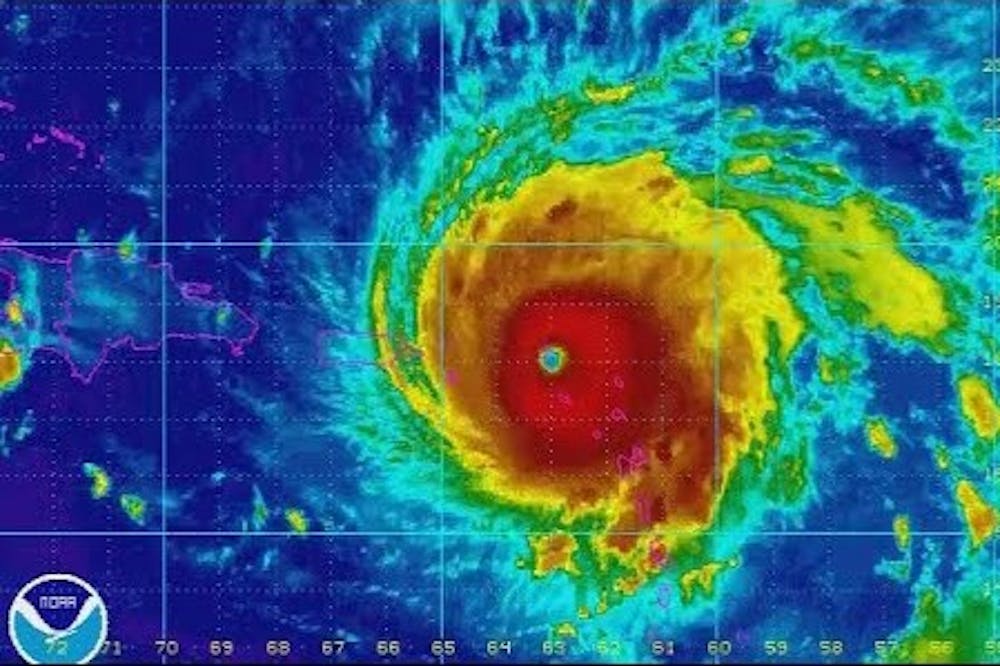The hurricane season, which officially runs from June 1 to Nov. 30, has recently become very active with three successive hurricanes — Harvey, Irma and Jose — achieving Category 4 status and setting records. In fact, this is the first time that two Category 4 storms have made landfall in the United States in the same season.
Hurricane Harvey hit mainland Texas on Aug. 25 where it stalled for a few days. According to Environmental Sciences Prof. Karen McGlathery, Harvey set a record for dumping the most amount of rain in that area. Hurricane Irma hit the Florida coast on Sept. 10 and set the record for being the largest Category 5 hurricane, according to McGlathery.
The formation of hurricanes can be affected by several factors, according to Environmental Sciences Prof. Michael Garstang.
“The hurricane depends upon the ocean for its energy and so that ocean needs to be quite warm — around about 80 degrees Fahrenheit at the ocean’s surface,” Garstang said.
Garstang further said that the water must evaporate and condense to form cumulonimbus clouds which have the ability to release energy as heat and drive the hurricane. He compares these clouds to the cylinders of an engine that drive the hurricane.
The National Hurricane Center says that the average hurricane season is marked by an average of 11.3 tropical storms per year forming in the North Atlantic. Of these tropical storms — which are characterized by winds of at least 39 mph— on average, 6.2 become hurricanes, with wind speeds greater than 74 mph. Of these hurricanes, an average of 2.3 become major hurricanes with wind speeds of at least 111 mph.
According to Environmental Science Associate Prof. Kevin Grise, the 2017 hurricane season has seen the formation of six hurricanes — three of which have achieved speeds of greater than 111 mph. While forecasters predicted that this season may be more active than usual, the current season is not an anomaly.
“It is not unprecedented to have three major hurricanes forming back to back — Ivan, Jeanne and Karl in 2004,” Grise said in an email to The Cavalier Daily. “The 2005 season had 15 hurricanes, of which 7 were major hurricanes.”
Director of Climatology Philip Stenger said that the severity of hurricane seasons appears to cycle every 20 to 30 years. While the 1980s and early 1990s were marked with low tropical storm activity, the past few years have seen increasing activity.
Grise said that there may be several factors leading to this active season. For instance, the lack of an El Niño event, which has been associated with decreasing the severity of hurricanes, as well as weak vertical wind shear or changes in wind speeds with height, may be contributors.
In addition, the season may be perceived as active due to the increase in damage to properties as infrastructure on shorelines expands, according to Stenger. With cities extending more and more toward coasts, more damage is incurred with the flooding and storm surges caused by hurricanes than in the past.
“That’s one of the things that drives the magnitude of damage and harm to people because you’re putting more things in harm’s way — more people and more property in harm’s way,” Stenger said. “And as that trend continues, there will assuredly be an increase in the damage that occurs due to these storms.”
However, Garstang said that it is difficult to pinpoint the exact causes of hurricanes and create models. He said that there may have been as many as 14 different models which all used different algorithms to create tracks that Hurricane Irma may take.
“[Models] have to make assumptions about how the heating is taking place, how it is being transported and how it is being used as fuel by the hurricane,” Garstang said.
The correlation between climate change and the frequency and severity of hurricanes is still not well understood. According to Stenger, there is still much uncertainty about the relationship between atmospheric conditions to the tropical storm season.
Environmental Sciences Prof. Deborah Lawrence said that there are three ways that climate change could theoretically be affecting the formation of hurricanes. One effect is that the oceans are warmer due to the increasing overall global temperature, resulting in the hurricanes receiving more energy and becoming more powerful. A second effect is that the temperature of the atmosphere is also increasing.
“[A] warmer atmosphere holds more water so when the storm is churning around towards Houston or towards Florida, it has more moisture in it … So the rainfall associated with hurricanes can be greater,” Lawrence said. “And then the third way that climate change affects the severity of hurricanes is by increasing sea level rise.”
This rise in sea level is contributing to an increase in flooding of coastal areas and an increase in damage to coastal city infrastructure.
While it is expected that these increasing water and atmospheric temperatures will increase the strength and frequency of hurricanes, there is no evidence of this phenomenon yet. Stenger said that waters in the Gulf of Mexico and the Atlantic have not been particularly warmer than normal, and that an increase of 0.5 to 1 degree Celsius would not significantly increase the severity of hurricanes
“The bottom line again is that there is no trend in strengthening storms or more destructive storms, but we have a lot to learn about how these things operate," Stenger said. "Right now, we don't necessarily see a specific trend, but over time ... something may emerge from the data.”







